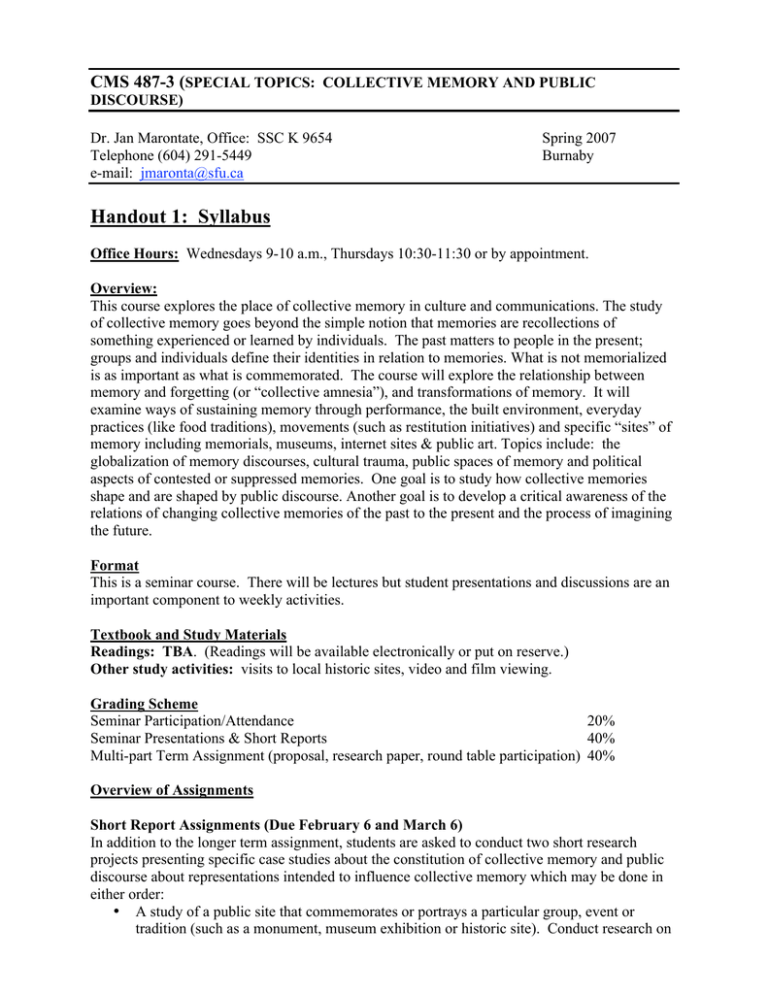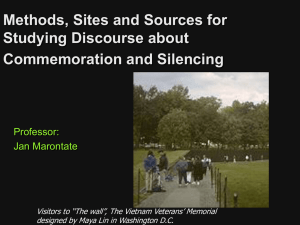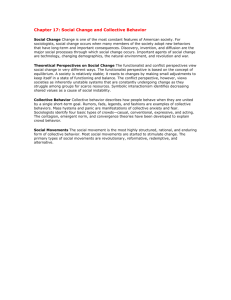Handout 1: Syllabus CMS 487-3 (
advertisement

CMS 487-3 (SPECIAL TOPICS: COLLECTIVE MEMORY AND PUBLIC DISCOURSE) Dr. Jan Marontate, Office: SSC K 9654 Telephone (604) 291-5449 e-mail: jmaronta@sfu.ca Spring 2007 Burnaby Handout 1: Syllabus Office Hours: Wednesdays 9-10 a.m., Thursdays 10:30-11:30 or by appointment. Overview: This course explores the place of collective memory in culture and communications. The study of collective memory goes beyond the simple notion that memories are recollections of something experienced or learned by individuals. The past matters to people in the present; groups and individuals define their identities in relation to memories. What is not memorialized is as important as what is commemorated. The course will explore the relationship between memory and forgetting (or “collective amnesia”), and transformations of memory. It will examine ways of sustaining memory through performance, the built environment, everyday practices (like food traditions), movements (such as restitution initiatives) and specific “sites” of memory including memorials, museums, internet sites & public art. Topics include: the globalization of memory discourses, cultural trauma, public spaces of memory and political aspects of contested or suppressed memories. One goal is to study how collective memories shape and are shaped by public discourse. Another goal is to develop a critical awareness of the relations of changing collective memories of the past to the present and the process of imagining the future. Format This is a seminar course. There will be lectures but student presentations and discussions are an important component to weekly activities. Textbook and Study Materials Readings: TBA. (Readings will be available electronically or put on reserve.) Other study activities: visits to local historic sites, video and film viewing. Grading Scheme Seminar Participation/Attendance 20% Seminar Presentations & Short Reports 40% Multi-part Term Assignment (proposal, research paper, round table participation) 40% Overview of Assignments Short Report Assignments (Due February 6 and March 6) In addition to the longer term assignment, students are asked to conduct two short research projects presenting specific case studies about the constitution of collective memory and public discourse about representations intended to influence collective memory which may be done in either order: • A study of a public site that commemorates or portrays a particular group, event or tradition (such as a monument, museum exhibition or historic site). Conduct research on 2 the subject represented. Critically analyze the “fit” between the depiction and other documentation about the subject represented. What does the depiction include and what is left out? What factors may have influenced the representation? Be sure to discuss both the object of remembrance and the depiction of it in context. • A study of written documentation, photographs or images (such as a film) presenting some aspect of the “collective memory” of a group, event or tradition that has been the object of public debates. For each prepare a short class presentation and a 5-7 page report. Refer to issues raised in at least two of the required readings in your report. Include a bibliography. Your short report is due the day of your class presentation. If you wish to do this as a team with one or two other classmates you must receive the approval of the professor. Note: All team members will be given the same grade for this assignment. Term Assignment (Proposal due March 6th, Presentation and Final Paper due April 3) This is a multi-stage term assignment centered on a major term paper of approximately 5,0006000 well-chosen words. [The body of the text should be around 10-15 pages double-spaced.] A one-page proposal of a term topic is due on March 6. More details will follow. Tentative Outline of Class sessions Part One: Theories and Methods of Analyzing Discourse about Collective Memory Week 1 (January 9): Introduction to the Course. Core concepts Week 2 (January 16): Processes & Social Forms of Remembering (Personal and Collective) Week 3 (January 23): The Performance of Memory-- Commemorative Practices, Bodily Memory, Public Events and Public Memorials Week 4 (January 30): Methods, Sites and Sources for Studying Discourse about Commemoration and Silencing Part 2: Themes in Collective Memory Research and Case Studies Week 5 (February 6): Class Presentations of First Short Reports Week 6 (February 13): Time & Place in Analytical Frameworks of Remembering, Forgetting and Silencing (Plotlines, Narratives and Other Patterns) Week 7 (February 20): Collective Memory and the Making of Inequality Week 8 (February 27): Collective Memory, Nation-building and Shared Identities Week 9 (March 6): Class Presentations of Second Short Reports. Proposal for Term Assignment due. Week 10 (March 13): Cultural Trauma and Restitution Movements. Week 11 (March 20): Silencing Memories (Cultural Amnesia, Censorship, and Denial) Week 12 (March 27): The Globalization of Collective Memory Discourses and Perspectives on the Future Week 13 (April 3): Conclusion & Round Tables on Term Assignments



